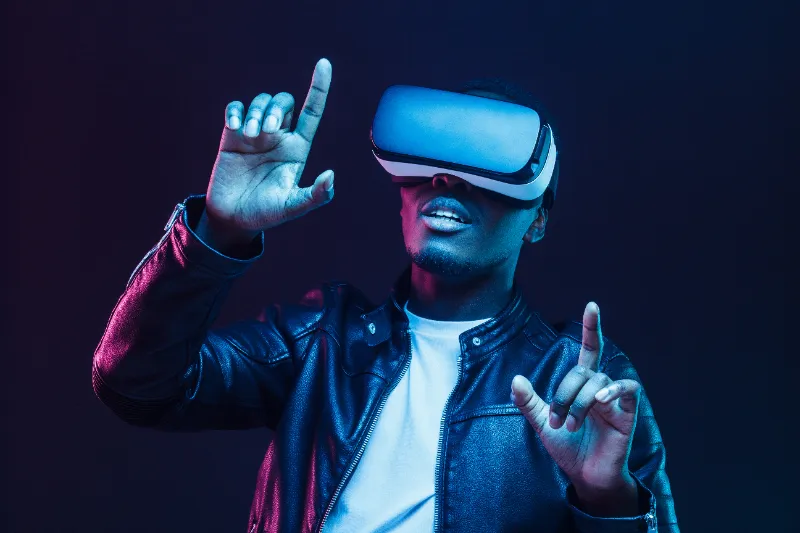The Cutting Edge: How AI, VR, and Blockchain are Revolutionizing Online Gaming
AI: Enabling Dynamic, Personalized Game Worlds
Reactive Environments and NPCs
Today's carefully scripted NPCs with limited capabilities will give way to fully autonomous characters driven by advanced AI:
- Adaptive dialog - NPC conversations can flow naturally based on context rather than following set scripts.
- Moods and emotions - Characters will react situationally based on sophisticated emotional modeling.
- Advanced pathfinding - Enemies can pursue players in complex, unpredictable ways instead of following predictable paths.
- Dynamic strategic thinking - NPCs can strategize, cooperate, and handle new scenarios on the fly during gameplay.
- More realistic behaviors - AI will power next-level animation, tactics, and survival instincts for enemies and allies.
This will enable game worlds that feel alive with characters that act human rather than just part of a pre-programmed experience.
Personalized Gameplay
Powerful AI can also tailor gameplay to each individual player:
- Adaptive difficulty - Challenge levels scale dynamically based on player skill, preventing frustration or boredom.
- Intuitive tutorials - AI guides new players only on the specific concepts they are struggling with.
- Intelligent recommendations - Systems suggest new games, strategies, or content based on analyzed playstyle preferences.
- Curating custom matches - AI matches players against suitable opponents and crafts personalized team compositions.
- Predicting retention - AI identifies who is at risk of quitting a game and steps in with incentives.
- Cheater detection - Algorithms automatically detect suspicious play patterns and dishonest behavior.
These examples demonstrate how AI can maximize enjoyment for each player while also driving better business outcomes for game studios.

VR: Immersed in Virtual Worlds
Presence and Emersion
VR headsets put players right inside dazzling game worlds. Key features heighten the sense of presence:
- Panoramic 3D views - Look freely in all directions with an ultra wide field of view.
- Position tracking - Freely move, duck, lean, and dodge thanks to precise motion tracking.
- Realistic scale - Room-scale VR provides actual 1:1 sizes and distances as you traverse environments.
- Interactive motion controllers - Intuitively grab, point, and manipulate objects using your virtual hands.
- Spatial 3D audio - Hear sounds realistically from any direction just like in real life.
When done right, VR allows suspending disbelief to feel transported to fantastical yet believable worlds. Presence leaves a powerful impression.
Social Engagement
Beyond solo adventures, VR enables new social engagements:
- Shared spaces - Hang out, watch media, or just chat together in interactive virtual rooms and worlds.
- Multiplayer games - Team up and battle together inside stunning cooperative VR games.
- Avatars - Customize detailed personal avatars visible to others for vivid self-expression.
- Face to face interaction - Some headsets recreate upper body movement and eye contact for life-like communication.
- Virtual events - Attend live concerts, conferences, or anything with others as personalized avatars.
VR multiplayer leverages the technology's strengths to foster social bonds missing from screen-based interactions. Shared adventures form lasting memories.
Blockchain: Rethinking Virtual Ownership

True Digital Asset Ownership
Blockchain ledgers can establish absolute ownership rights over virtual goods:
- Scarcity and persistence - Items become genuinely rare on a capped blockchain rather than duplicable at will. Purchases persist for life.
- Transferable value - Gamers can freely trade blockchain-backed items through secure token transactions. Uniqueness creates active virtual economies.
- Authenticated provenance - Blockchain histories verify authenticity and origins of items, preventing fake copies.
By aligning virtual items with real-world value, blockchain promises to disrupt traditional in-game economies and business models. Value accrues within player communities rather than siloed games.
Decentralized Platforms
Some envision blockchain underpinning entirely new decentralized gaming platforms:
- Persistent tokenized profiles - Players maintain secure blockchain profiles containing currencies, items, and achievements across all games.
- Distributed hosting - Games run on peer-to-peer nodes rather than centralized servers owned by publishers.
- Community-driven governance - Decentralized Autonomous Organizations give players voting rights to collectively guide platform evolution.
- Crowdfunding potential - Communities can fund games via crypto token sales. Developers retain ownership of successes.
While the feasibility of fully decentralized gaming remains speculative, blockchain pilots are already changing perceptions around virtual asset ownership and working toward interoperable economies. Gamers stand to gain more control.
Key Challenges and Opportunities
Despite their obvious potential, effectively integrating these technologies poses some challenges:
- VR hardware still needs to become more affordable, comfortable, and accessible before hitting critical mass. Motion sickness also affects a significant portion of users.
- Current AI lacks the general intelligence to power truly human-like NPC behaviors or experiences. Near term applications will stay narrow.
- Scalability and computational costs may curb some of blockchain's more disruptive premises. Mainstream adoption also relies on everyday crypto acceptance.
Yet the opportunities feel boundless, especially as these technologies mature and converge together. For example, immersed first-person experiences combined with reactive AI enemies and decentralized item ownership promise completely unprecedented gaming possibilities.
What Does the Future Hold?
Here we speculate on how AI, VR, and blockchain might manifest together in real pioneering games:

Persistent Social Metaverse Worlds
Massive shared virtual worlds where users roam as their true personalized avatar. Experience concerts, events, or just hang out casually. AI drives lifelike characters and blockchain ensures all items stay uniquely yours across worlds.
Procedurally Generated Dungeon Crawlers
Roguelike adventures with unpredictable enemies and layouts generated by AI to stay fresh each playthrough. No memorizing patterns. Multiplayer modes let friends team up to conquer the changing challenges together.
Autonomous Strategy Game Opponents
Classic turn-based strategy versus AI generals powered by machine learning rather than scripts. They adapt tactics based on past encounters to provide dynamic long-term challenges and push players to constantly improve.
Augmented Tabletop and Card Gaming
AR visualizes customizable game pieces, cards, and environments projected onto real tabletop surfaces. Automatic bookkeeping, rules enforcement, and virtual assistants enhance the physical experience rather than replacing it.
Lifetime Player Legacy
A secure blockchain profile persists each player's complete history - characters, achievements, creations across all games. AI analyzes this trove of data to shape increasingly personalized experiences the more someone plays.
Of course these represent just a sample of the gaming innovation unlocked by AI, VR, blockchain, and their convergence. The possibilities feel endless!
Balancing Innovation With Inclusiveness
Moving forward, the industry must ensure these bleeding edge technologies do not leave segments of gamers behind. Accessibility will require:
- Approachable costs - Keeping hardware and game pricing within reach of general consumers.
- Comfort options - Allowing flexibility if certain features like VR motion cause discomfort.
- Alternative inputs - Supporting assistive peripherals that replace standard controllers.
- Customizable UIs - Offering UI options tailored to sensory/mobility needs.
- Difficulty adjustments - Ensuring AI-driven challenges remain fun rather than frustrating for newcomers.
- Social considerations - Handling identity representation, toxicity mitigation, and creating welcoming communities.
With mindfulness toward inclusion, both cutting edge and casual gamers alike can share in the amazing innovations on the horizon. The future looks bright!
Frequently Asked Questions
How expensive will future VR gear remain?
Prices are expected to decline as adoption increases, but some cost will always exist given the sophisticated technology required. That said, experiences could happen through household setups shared by families rather than requiring personal rigs. Cloud streaming may help too.
Can AI truly replicate human intuition and randomness?
Near term AI cannot match general human cognition, however narrow AI focused on specific gaming goals already exhibits impressively human-like behaviors. With continued exponential advances, deeper machine intuition may emerge over coming decades.
Will blockchain tech require significant learning curves?
Early blockchain tools were quite user-unfriendly, however the space now recognizes the UX challenges. Major strides have been made in abstracting away complexity to build accessible tools and games leveraging blockchain in intuitive ways.
How susceptible will advanced AI be to manipulation or toxicity?
Moderation and ethical training datasets will remain essential to avoiding hijacking of gaming AIs. Best practices in transparency, testing, and allowing user reporting of bad behaviors will enable keeping advanced systems in check.
Can VR completely eliminate motion sickness?
Motion sickness arises from visual/vestibular mismatch, so some discomfort may persist for those prone to it. That said, higher frame rates, improved motion prediction, avatar customization, and comfort options will continue reducing effects for most users.
Conclusion
AI, VR, and blockchain are primed to take today's amazing online gaming experiences to entirely new heights. The future looks incredibly exciting. While some challenges around access and responsible design exist, inclusive game development practices will enable all types of gamers to benefit from and have fun with these emerging technologies as they see gaming innovation accelerate like never before. Online gaming moves into a pioneering new frontier!





